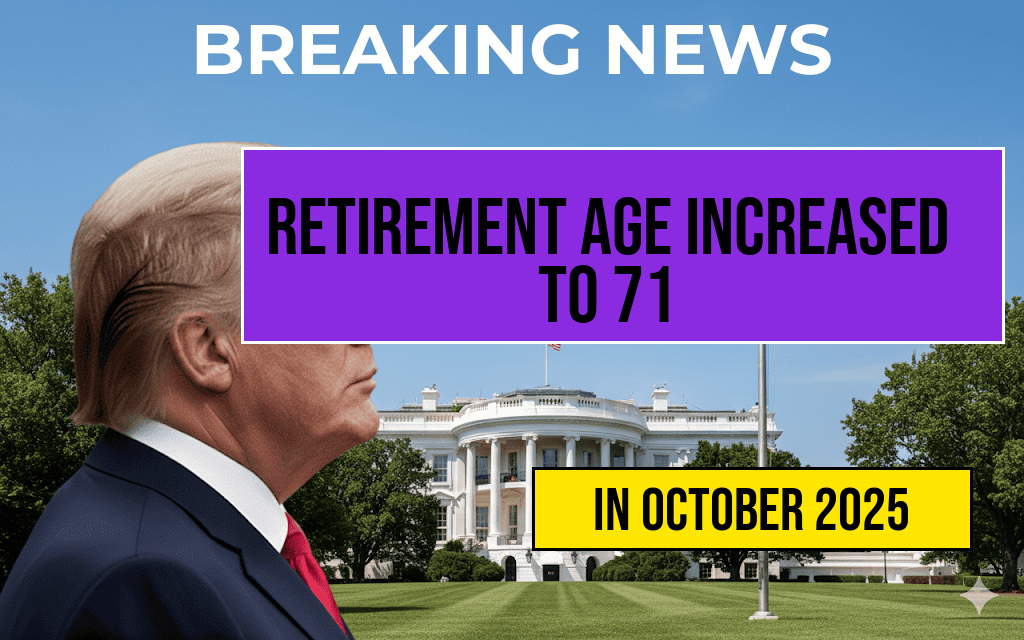The Social Security Administration (SSA) has officially adjusted the full retirement age to seventy-one years old, marking a significant shift in the timeline for Americans planning their retirement benefits. This change, part of ongoing reforms to sustain the program’s long-term viability, affects individuals born in 1959 and later. Previously, the full retirement age increased gradually from 65 to 66, and later to 67 for those born in 1960 or after. Now, with the new adjustment, Americans born in 1962 or later will reach their full retirement age at 71, impacting benefits calculation and retirement planning. The move comes amid demographic shifts, longer life expectancies, and financial pressures on the Social Security Trust Fund, prompting policymakers to consider extending the retirement age further than initially projected.
Background of the Retirement Age Adjustment
The concept of a full retirement age (FRA) has historically served as a benchmark for when individuals become eligible for full Social Security benefits. Since its inception in 1935, the program has undergone multiple adjustments to adapt to changing demographics and economic realities. The most recent modifications increased FRA from 65 to 66 for those born between 1937 and 1954, with a further increase to 67 for those born in 1960 or later.
However, recent projections from the SSA indicate that life expectancy has continued to rise, necessitating further adjustments to ensure the program’s sustainability. In response, the Social Security Trustees recommended raising the full retirement age to 71 for individuals born in 1962 and beyond, a move designed to align benefits with increased longevity and economic shifts. The change is part of broader reforms that aim to balance the financial health of the program while providing fair access to retirement benefits.
Impact on Retirement Planning and Benefits
| Birth Year Range | Previous FRA | New FRA |
|---|---|---|
| 1937–1954 | 65 | 65 |
| 1955–1959 | 66 | 66 |
| 1960 | 66 | 66 |
| 1961 | 66 | 67 |
| 1962 and later | 67 | 71 |
For individuals nearing retirement, this shift can influence decisions about when to claim benefits. Claiming early, before reaching the full retirement age, results in reduced monthly payments, while delaying benefits increases the monthly amount due to delayed retirement credits. Extending the FRA to 71 means that those born after 1962 must work several additional years to qualify for unreduced benefits, potentially affecting retirement savings and lifestyle plans.
According to experts, the extension aims to encourage longer workforce participation and reflect increased lifespans. However, it also raises concerns about the economic burden on workers who may need to prolong employment, especially in physically demanding jobs or for individuals facing health challenges. Additionally, this change may influence the broader retirement landscape, prompting individuals to reassess their savings strategies and retirement timelines.
Financial Implications for Beneficiaries
Benefits Calculation and Timing
The SSA calculates retirement benefits based on the highest 35 years of earnings, adjusted for inflation. The age at which a person claims their benefits directly impacts the monthly payout. Claiming at full retirement age ensures receival of the standard benefit amount, but individuals can choose to claim earlier or later for adjusted payments.
With the new FRA at 71, the window for claiming benefits without reduction widens, though the trade-off involves working longer or delaying retirement. For those who opt to claim early, benefits could be reduced by approximately 30–35% if taken at age 62, whereas waiting until age 70 or beyond increases monthly benefits by roughly 8% annually due to delayed retirement credits.
Potential Challenges and Opportunities
- Retirement Savings: Workers may need to bolster their savings to compensate for the extended working years.
- Health and Employment: Prolonged employment could pose challenges for individuals in physically demanding roles or with health issues.
- Economic Planning: The change prompts a reassessment of retirement age expectations, influencing financial planning and policy discussions.
Public Response and Future Outlook
The adjustment to a full retirement age of 71 has elicited mixed reactions from advocacy groups, economists, and the general public. Supporters argue it is a necessary step to ensure the program’s long-term viability amidst demographic shifts, while critics express concern over the increased burden on workers and the potential for delayed retirement to exacerbate income inequality.
Some experts suggest that this change could accelerate reforms in related social programs and motivate policymakers to explore additional measures, such as benefit adjustments or increased revenue through payroll taxes. As the policy takes effect, individuals are encouraged to review their retirement plans and consult with financial advisors to adapt to the evolving landscape.
For more detailed information on Social Security reforms and retirement planning, resources like the official SSA website and comprehensive analyses on Wikipedia provide valuable insights.
Frequently Asked Questions
What is the new full retirement age for Social Security benefits in the United States?
The full retirement age for Social Security benefits has been increased to 71 years in the United States, reflecting recent changes in policy and demographic trends.
Why was the full retirement age raised to 71?
The increase in the full retirement age aims to ensure the sustainability of the Social Security system as life expectancy and the workforce demographics evolve.
How does the new retirement age affect eligibility for Social Security benefits?
Individuals will now be eligible to receive full benefits at age 71. Those retiring earlier will receive reduced benefits, while delaying benefits beyond age 71 can increase the monthly payout.
Will the change to age 71 impact all workers equally?
No, the impact varies based on individual retirement plans and work history. Some may choose to retire earlier or later depending on personal circumstances, but the full benefit age is now 71 for everyone.
What should workers consider when planning for retirement with the new age limit?
Workers should consider personal health, financial needs, and retirement goals when planning, as the full retirement age extension to 71 may influence timing decisions and benefit amounts.








